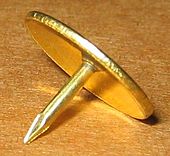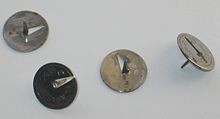

A drawing pin (in British English) or tack (in North American English), also called a push-pin, is a short, small pin or nail with a flat, broad head that can be pressed into place with pressure from the thumb, often used for hanging light articles on a wall or noticeboard.
Thumb tacks made of brass, tin or iron may be referred to as brass tacks, brass pins, tin tacks or iron tacks, respectively. These terms are particularly used in the idiomatic expression to come (or get) down to brass (or otherwise) tacks, meaning to consider basic facts of a situation.
History
The drawing pin was invented in name and first mass-produced in what is now the United States in the mid/late 1750s; the earliest use of the term, Drawing Pin, is listed in the Oxford English Dictionary as 1812. It was said that the use of the newly invented drawing pin to attach notices to school house doors was making significant contribution to the whittling away of their gothic doors. Modern drawing pins were also found as standard in architects' drawing boxes in the late 18th century.

Edwin Moore patented the "push-pin" in the US in 1900 and founded the Moore Push-Pin Company. Moore described them as a pin with a handle. In 1903, in the German town of Lychen, clockmaker Johann Kirsten invented flat-headed pins for use with drawings, although other sources credit Austrian factory owner Heinrich Sachs with inventing a pin pressed from a single disk of metal in 1888. This style of pin, with the pin formed by a cutout from the head, is still widely sold in Austria under the brand 'Sax'.
Design

A drawing pin has two basic components: the head, often made of plastic, metal or wood, and the body, usually made of steel or brass. The head is wide to distribute the force of pushing the pin in, allowing only the hands to be used. Many head designs exist: flat, domed, spherical, cylindrical and a variety of novelty heads such as hearts or stars. Drawing pin heads also come in a variety of colours. These can be particularly useful to mark different locations on a map. Some drawing pin designs have a portion cut out of the head and bent downward to produce a pin.

Domed or gripped heads are sometimes preferred over flat heads as dropped flat-headed pins may easily point upward, posing a hazard. Drawing pins also pose a hazard of ingestion and choking, where they may do serious harm.
References
- "tack, n. 1.a." Oxford English Dictionary. Oxford University Press.
- "brass, n. P2". Oxford English Dictionary. Oxford University Press.
- Ainslie, Joannes (1812). Comprehensive treatise on land surveying, comprising the theory and practice in all its branches; in which the use of the various instruments employed in surveying, levelling, &c. is clearly elucidated by practical examples.
- "Parish and Belonging: Community, Identity and Welfare in England and Wales – 1700-1950", K.D.M Snell, Professor of Rural and Cultural History at Leicester University; Cambridge Press, 2006.
- Rubino, Anthony (2011). Essential Shit: Bollocks! Why Didn't I Think of That?. David & Charles. p. 56. ISBN 9781446354834.
- Katrin Bischoff, Jürgen Schwenkenbecher. Die Reißzwecke von Lychen Archived 26 December 2015 at the Wayback Machine In: Berliner Zeitung, 11. November 2003; Retrieved on 4 October 2013.
- Teelucksingh, S; V Naraynsingh (July 1997). "Injury to Diabetic Feet by Thumb Tacks". The Lancet. 350 (9070): 74. doi:10.1016/s0140-6736(05)66286-1. PMID 9217749.
- Robert, Rea (August 1949). "Perforation of the Esophagus by a Thumb Tack and Subsequent removal by an electromagnet". Journal of the American Medical Society: Otolaryngology—Head and Neck Surgery. 50 (2).
External links
 The dictionary definition of thumbtack at Wiktionary
The dictionary definition of thumbtack at Wiktionary Media related to Pushpins at Wikimedia Commons
Media related to Pushpins at Wikimedia Commons Media related to Drawing pins at Wikimedia Commons
Media related to Drawing pins at Wikimedia Commons